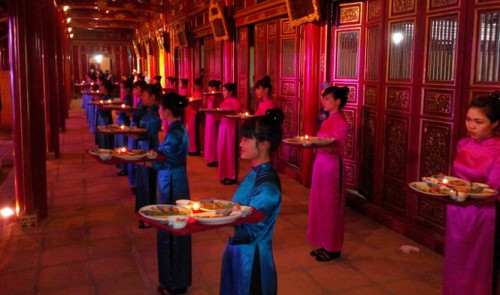Various royal activities offered to tourists
A slew of royal activities which promise to appeal to tourists have kicked off at the UNESCO-recognized Hue Complex of Monuments in central Viet Nam.
The Hue Monuments Conservation Center in Thua Thien-Hue Province has announced it had commenced scores of such activities at a number of relics in Hue, the provincial capital city.
Hue served as the capital under the Nguyen Dynasty (1802-1945) – the Southeast Asian country’s last monarchy reign.
Truong Sanh Palace inside the Hue Royal Palace now features objects and delicacies used by the kings and royal members, including royal tea, complexion nourishing cream, pillows, and “ao dai” (traditional Vietnamese long gown).
Co Ha Regal Garden, also part of the Hue Royal Palace, has been turned into a venue for demonstrations of the imperial capital’s time-honored traditional crafts such as Sinh Village’s folk paintings and Thanh Tien Village’s paper flowers.
Meanwhile, cuisine sections are expected to be organized at Dong Khuyet Edifice, located in another area of the Royal Palace.
The commemorative house for Queen Mother Tu Cung, at 79 Phan Dinh Phung Street, will be home to archival exhibitions, royal cuisine sections, and performances of “ca Hue thinh phong” (Hue chamber music) and “ao dai.”
 |
| A re-enactment of a sophisticated royal feast during the 2014 Hue Festival at the Hue Royal Palace in the central province of Thua Thien-Hue (Photo: Tuoi Tre) |
Situated at 79 Nguyen Chi Dieu Street, the edifice where high-ranking court officials worked will serve as a venue where royal tea drinking and making rituals will be re-enacted.
The Complex of Hue Monuments was inscribed as a UNESCO world heritage site in 1993.
It is located in and around Hue City in the geographical center of Viet Nam and with easy access to the sea, UNESCO says on its website.
Established as the capital of unified Viet Nam in 1802 CE, Hue was not only the political but also the cultural and religious center under the Nguyen Dynasty – the last royal dynasty of Vietnamese history – from 1802 to 1945 CE, the UN agency adds.
According to the provincial Department of Culture, Sports, and Tourism, Thua Thien- Hue received roughly 178,488 visits in January, a one percent year-on-year rise.
Among them, international visits were 70,218.
The province earned over VND216 billion (US$10.07 million) in tourism revenue last month, an 11 percent rise compared to the same period last year.
This year Thua Thien-Hue strives to draw up to 3.3 million visits, including 1.2 million international tourist visits, with myriad activities and special discount programs.